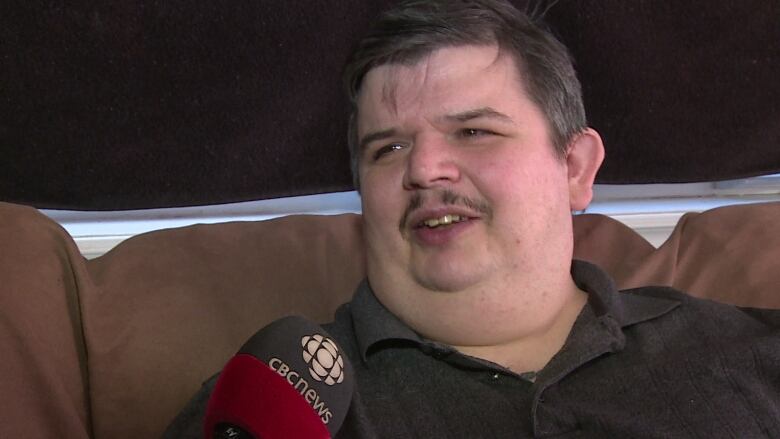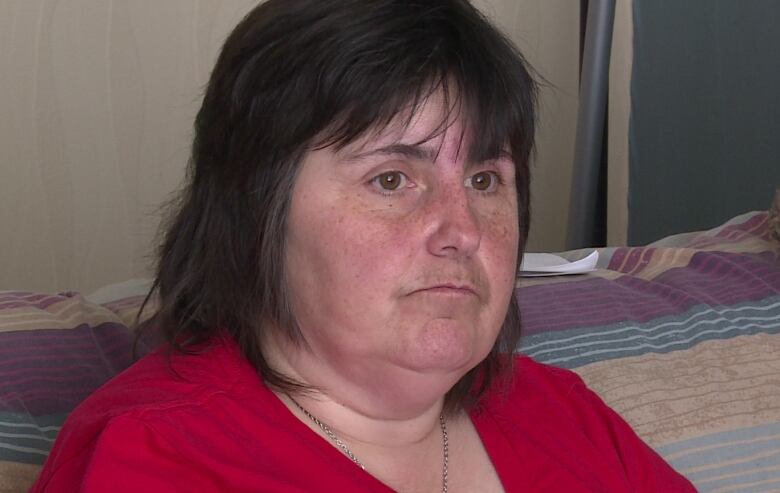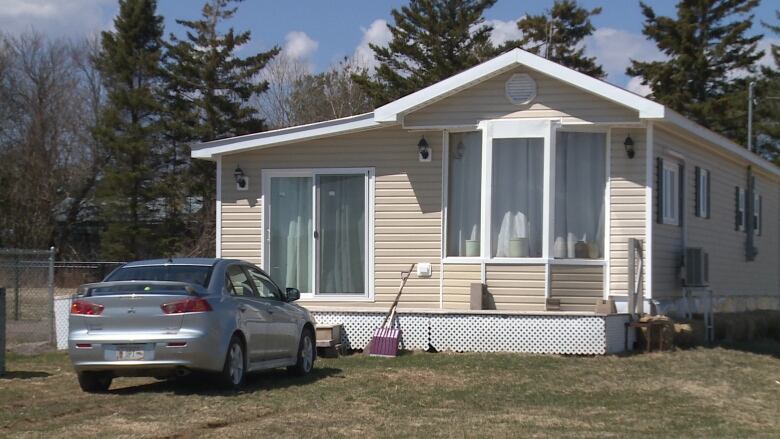P.E.I. denies social assistance to man caring for woman with multiple sclerosis
Province says pair is in common-law relationship and should share pension of $9,500 per year

A Souris-area man says he's been unfairly cut off from social assistance because the government has incorrectly determined he and a woman he's caring for are a couple.
Jonathon Tsamantanis lives with Barb Dingwell in Eglington. He goes shopping, takes out the garbage, and helps prepare meals everything Dingwell struggles with. She has multiple sclerosis, and can't get out of bed some days.
[We're] best friends with no benefits. Barb Dingwell
The pair used to date and lived together for six years, but they broke up in 2009 and Tsamantanis moved out. Tsamantanis moved back in with Dingwell in 2014 to help take care of her. He describes the relationship as "true friendship."
"She's been dealt some harsh blows in life and she's helped me through rough times," he said. "I just couldn't abandon her."
Tsamantanis says he can't work because of a degenerative disc disease in his neck. He says he'sin pain but has put off surgery because the recovery period would leave him unable to care for Dingwell.
'She was very alone'

WhenTsamantanis applied for social assistance in 2015, he says he told the Department of Family and Human Services he hadmovedin with Dingwell to take care of her.
"She was very alone, even isolated. So that's why I thought it'd be a good idea [to move in] ... She doesn't really have anyone else," saidTsamantanis.
They signed a social services document confirming they would be cohabitating and jointly filed for social assistance.
Tsamantanis and Dingwell both say they didn't intend to identify themselves as a couple by signing the document.
Provincial government documents written by a social assistance worker at the time and signed by both Dingwell and Tsamantanis say Dingwell identified Tsamantanis as her boyfriend. The documents also refer to them as a common-law couple.
Dingwell says she never called Tsamantanis her boyfriend or mentioned the words "common-law." Tsamantanis says neither of them read the full document before they signed it.
He says they started receiving a combined social assistance paymentof $176 per month.
The documents also confirmTsamantaniscan't work and the payments were to "meet basic needs."
'A broken system'

Officials re-evaluated Dingwell's file in March 2016 and determined she and Tsamantanis were no longer eligible for social assistance.
The department's rules state a couple should share any income.In the case of Tsamantanis and Dingwell the department determinedthe two of them should live off her yearly income of $9,500money Dingwell has received since 2010 from the Canadian Pension Plan's Disability Benefit plus a private pension.
The province then cut off the pair's social assistance the only money with Tsamantanis' name on it. He and Dingwell appealed the decision but lost. Appeal board documents ruled their argument that they're not a couple"was for the purpose of qualifying for assistance."
"I think it's a broken system. You do feel that desperation, like no one's listening, no one understands how hard it can be," Tsamantanis said.
'Best friends with no benefits'
Both Tsamantanis and Dingwell insist they aren't in a romantic relationship.
They say they don't share bank account or a bed and have separate sleeping areas in the house, which Dingwell owns.
Tsamantanis says he needs social assistance to pay for his personal needs. Right now, his drug prescriptions, his clothes, the cost of a haircut all come out of Dingwell's income.
Of course we're seen together a lot, but does that mean we're common-law? No, it doesn't. Jonathon Tsamantanis
"Right now it is tough. Tough to try to support two people on that amount of money," Dingwell said.
"Jon is my best friend in the world. He's my caregiver, he does pretty well everything that I'm unable to do. There's lots of days that maybe I can't get out of bed for hours at a time, where he has to take care of the house.
"[We're] best friends with no benefits."
Denied even if he moves out

The province has a framework in place to determine whether two people living together are a couple.
Things like whether household costs are paid out of the same account, if the pair isknown as partners by public authorities and doctors, or when one person assumes responsibility for housing, are all factored into the decision.
How often a couple is seen together in the community can also be a factor.
"Quite often I take her to her doctor, shopping," said Tsamantanis. "Of course we're seen together a lot, but does that mean we're common-law? No, it doesn't."
Tsamantanis has offered to get his own place nearby, but according to a document created after the appeal, asocial assistance worker determined that would be a "move of convenience" in order to obtain benefits, saying he would be denied social assistance either way.
Making life a bit easier
Dingwell says the ordeal has been stressful.
Her MS, which she calls her "monster," is only getting worse and she'll only need more help from Tsamantanisin the future.
"There have been a few times that if it wasn't for Jon, I don't know what would have happened to me," she said.
"It would help if Jon would have a little bit of support from social services. He can't work, I can no longer work. It would just make life a little bit easier."
Tsamantanis filed a complaint against the province with the P.E.I. Human Rights Commission on April 18. The Department of Family and Human Services has 30 days to respond.
The province says it can't comment on specific cases in the social assistance system or address the human rights complaint. For privacy reasons, the Department of Family and Human Services also says it can't publicly acknowledge whether someone is a client.












_(720p).jpg)


 OFFICIAL HD MUSIC VIDEO.jpg)
.jpg)



























































































